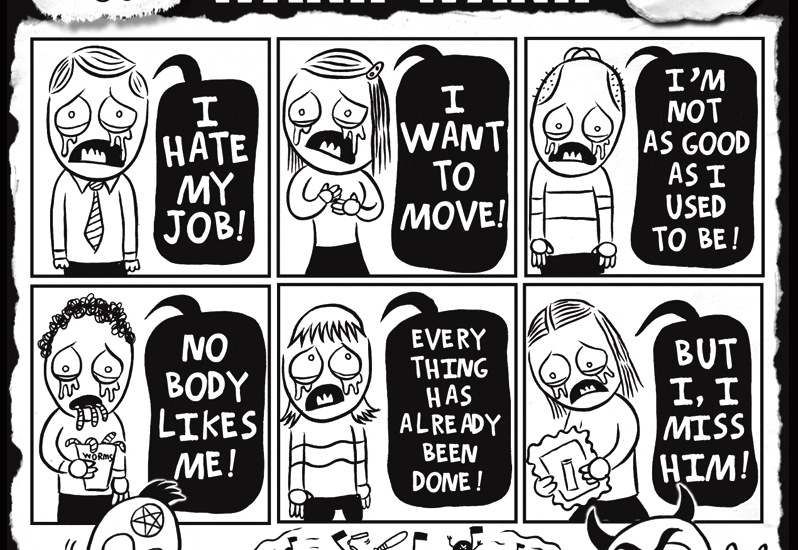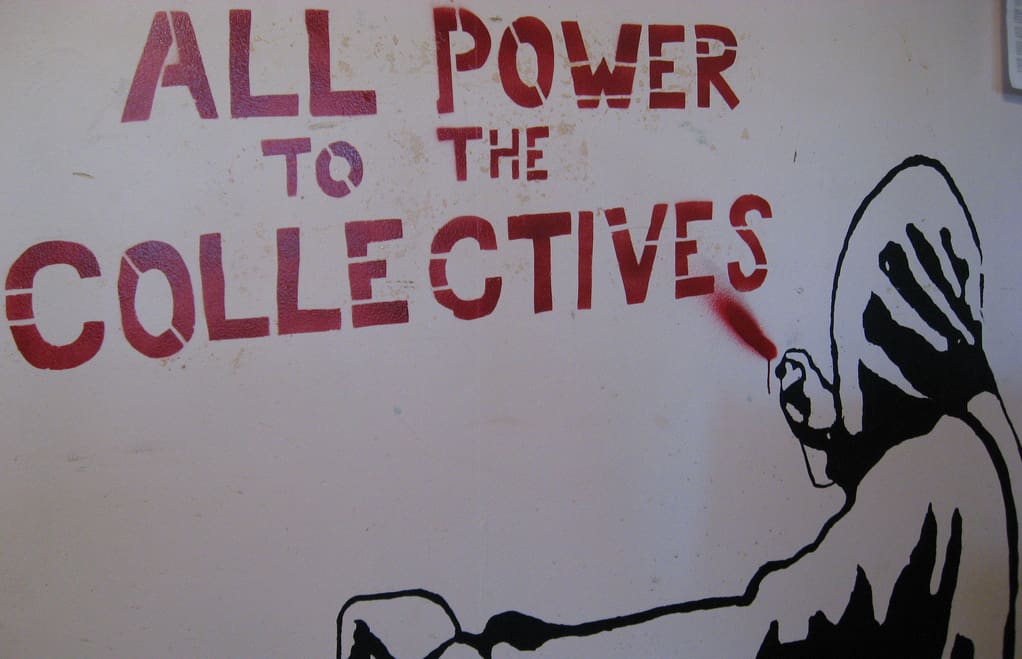AntiNote: Just another periodic reminder that there is nothing new under the sun. Enjoy the text, and be comforted and embarrassed by the knowledge that you are not alone, and not the first.
“If the contemporary Left often clings to the formations and formulations of another epoch, one in which the notion of unified movements, social totalities, and class-based politics appeared to be viable categories of political and theoretical analysis, this means that it literally renders itself a conservative force in history—one that not only misreads the present but installs traditionalism in the very heart of its praxis, in the place where commitment to risk and upheaval belongs.”
Resisting Left Melancholy
by Wendy Brown for the journal boundary 2, Vol. 26, no. 3 (Fall 1999)
initially reprinted on the blog Deterritorial Investigations Unit, 30 September 2015
“In every era the attempt must be made anew to wrest tradition away from a conformism that is about to overpower it…Only that historian will have the gift of fanning the spark of hope in the past who is firmly convinced that even the dead will not be safe from the enemy if he wins.”
—Walter Benjamin, “Theses on the Philosophy of History”
(Illuminations: Essays and Reflections)
For the last two decades, cultural theorist Stuart Hall has insisted that the “crisis of the Left” is due neither to internal divisions in the activist or academic Left nor to the clever rhetoric or funding schemes of the Right. Rather, he has charged, this ascendancy is consequent to the Left’s own failure to apprehend the character of the age and to develop a political critique and a moral-political vision appropriate to this character.
For Hall, the rise of the Thatcher-Reagan Right was a symptom rather than a cause of this failure, just as the Left’s dismissive or suspicious attitude toward cultural politics is for Hall a sign not of its unwavering principles but of its anachronistic habits of thought and its fears and anxieties about revising those habits.
But what is the content and dynamic of these fears and anxieties? How would we begin to plumb these? Impossible to explore exhaustively in these few pages, I want to consider just one dimension of them, a dimension that many decades earlier Walter Benjamin termed “left melancholy.”
As most readers will know, Benjamin was neither categorically nor characterologically opposed to the value and valence of sadness as such, nor to the potential insights gleaned from brooding over one’s losses. Indeed, he had a well-developed appreciation of the productive value of acedia, sadness, and mourning for political and cultural work, and in his study of Charles Baudelaire, Benjamin treated melancholia itself as something of a creative wellspring.
But left melancholy is Benjamin’s unambivalent epithet for the revolutionary hack who is, finally, attached more to a particular political analysis or ideal—even to the failure of that ideal—than to seizing possibilities for radical change in the present. In Benjamin’s enigmatic insistence on the political value of a dialectical historical grasp of “the time of the Now,” left melancholy represents not only a refusal to come to terms with the particular character of the present, that is, a failure to understand history in terms other than “empty time” or “progress.” It signifies, as well, a certain narcissism with regard to one’s past political attachments and identity that exceeds any contemporary investment in political mobilization, alliance, or transformation.[i]
The irony of melancholia, of course, is that attachment to the object of one’s sorrowful loss supersedes any desire to recover from this loss, to live free of it in the present, to be unburdened by it. This is what renders melancholia a persistent condition, a state, indeed, a structure of desire, rather than a transient response to death or loss.
In Freud’s 1917 meditation on melancholia, he reminds us of a second singular feature of melancholia: It entails “a loss of a more ideal kind [than mourning]. The object has not perhaps actually died, but has been lost as an object of love.” Moreover, Freud suggests, the melancholic subject will often not know precisely what about the object has been loved and lost—“this would suggest that melancholia is in some way related to an object-loss which is withdrawn from consciousness, in contradistinction to mourning, in which there is nothing about the loss that is unconscious.”[ii]
The loss precipitating melancholia is more often than not unavowed and unavowable. Finally, Freud suggests that the melancholic subject—low in self-regard, despairing, even suicidal—has shifted the reproach of the once loved object (a reproach waged for not living up to the idealization by the beloved) onto itself, thus preserving the love or idealization of the object even as the loss of this love is experienced in the suffering of the melancholic.
Now why would Benjamin use this term, and the emotional economy it represents, to talk about a particular formation on and of the Left? Benjamin never offers a precise formulation of left melancholy. Rather, he deploys it as a term of opprobrium for those more beholden to certain long-held sentiments and objects than to the possibilities of political transformation in the present.
Benjamin is particularly attuned to the melancholic’s investment in “things.” In The Origin of German Tragic Drama, he argues that “melancholy betrays the world for the sake of knowledge,” here suggesting that the loyalty of the melancholic converts its truth (“every loyal vow or memory”) about its beloved into a thing, indeed, imbues knowledge itself with a thing-like quality. Another version of this formulation: “In its tenacious self-absorption [melancholy] embraces dead objects in its contemplation.” More simply, melancholy is loyal “to the world of things,” suggesting a certain logic of fetishism—with all the conservatism and withdrawal from human relations that fetishistic desire implies—contained within the melancholic logic.[iii]
In his critique of Erich Kästner, a left-wing poet from the Weimar Republic, in which he first coins the phrase “left melancholy,” Benjamin suggests that sentiments themselves become things for the left melancholic who “takes as much pride in the traces of former spiritual goods as the bourgeois do in their material goods.”[iv] We come to love our left passions and reasons, our left analyses and convictions, more than we love the existing world that we presumably seek to alter with these terms or the future that would be aligned with them.
Left melancholy, in short, is Benjamin’s name for a mournful, conservative, backward-looking attachment to a feeling, analysis, or relationship that has been rendered thing-like and frozen in the heart of the putative leftist. If Freud is helpful here, then this condition presumably issues from some unaccountable loss, some unavowably crushed ideal, contemporarily signified by the terms left, socialism, Marx, or movement.
Certainly the losses, accountable and unaccountable, of the Left are many in our own time. The literal disintegration of socialist regimes and the legitimacy of Marxism may well be the least of it. We are awash in the loss of a unified analysis and unified movement, in the loss of labor and class as inviolable predicates of political analysis and mobilization, in the loss of an inexorable and scientific forward movement of history, and in the loss of a viable alternative to the political economy of capitalism.
And on the backs of these losses are still others: We are without a sense of an international, and often even a local, left community; we are without conviction about the truth of the social order; we are without a rich moral-political vision to guide and sustain political work. Thus, we suffer with the sense of not only a lost movement but a lost historical moment; not only a lost theoretical and empirical coherence but a lost way of life and a lost course of pursuits. This much many on the Left can forthrightly admit, even if we do not know what to do about it.
But in the hollow core of all these losses, perhaps in the place of our political unconscious, is there also an unavowed loss—the promise that left analysis and left commitment would supply its adherents a clear and certain path toward the good, the right, and the true? Is it not this promise that formed the basis for much of our pleasure in being on the Left, indeed, for our self-love as leftists and our fellow feeling toward other leftists? And if this love cannot be given up without demanding a radical transformation in the very foundation of our love, in our very capacity for political love or attachment, are we not doomed to left melancholy, a melancholy that is certain to have effects that are not only sorrowful but self-destructive?
Freud again: “If the love for the object—a love which cannot be given up though the object itself is given up—takes refuge in narcissistic identification, then the hate comes into operation on this substitutive object, abusing it, debasing it, making it suffer and deriving sadistic satisfaction from its suffering.”[v] Now our challenge would be to figure out who or what is this substitutive object. What do we hate that we might preserve the idealization of that romantic left promise? What do we punish that we might save the old guarantees of the Left from our wrathful disappointment?
Two familiar answers emerge from recent quarrels and reproaches on the Left. The first is a set of social and political formations variously known as cultural politics or identity politics. Here the conventional charge from one portion of the Left is that political movements rooted in cultural identity—racial, sexual, ethnic, or gendered—not only elide the fundamental structure of modernity, capitalism, and its fundamental formation, class, but fragment left political energies and interests such that coalition building is impossible.
The second culprit also has various names—poststructuralism, discourse analysis, postmodernism, trendy literary theory got up as political analysis. The murder charges here are also familiar: Postfoundational theories of the subject, truth, and social processes undermine the possibility of a theoretically coherent and factually true account of the world, and also challenge the putatively objective grounds of left norms.
Together or separately, these two phenomena are held responsible for the weak, fragmented, and disoriented character of the contemporary Left. This much is old news. But if read through the prism of left melancholy, the element of displacement in both sets of charges may appear more starkly, since we would be forced to ask: What aspects of left analysis or orthodoxy have wilted on the vine for its adherents but are safeguarded from this recognition through the scornful attention heaped on identity politics and poststructuralism?
Indeed, what narcissistic identification with that orthodoxy is preserved in the lament over the loss of its hold on young leftists and the loss of its potency in the political field? What love for the promises and guarantees that a left analysis once held is preserved, as responsibility for the tattered condition of those promises and guarantees is distributed onto debased others? And do we here also see a certain thing-ness of the Left take shape, its reification as something that “is,” the fantastical memory that it once “was,” at the very moment that it so clearly is not/one?
* * * *
Now let us bring these speculations about a melancholic Left back to Hall’s more forthrightly political considerations about the troubles of the contemporary Left. If Hall understands our failure as a Left in the last quarter century as a failure within the Left to apprehend this time, this is a failure that is only reiterated and not redressed by our complaints against those who are succeeding (liberal centrists, neoconservatives, the Right) or by our complaints against one another (antiracists, feminists, queer activists, postmodernists, unreconstructed Marxists).
In Hall’s understanding, this failure is not simply the consequence of adherence to a particular analytic orthodoxy—the determinism of capital, the primacy of class—although it is certainly that. Rather, this failure results as well from a particular intellectual straitjacket—an insistence on a materialism that refuses the importance of the subject and the subjective, the question of style, and the problematic of language.
And it is the combination of these two that is deadly: “Our sectarianism,” Hall argues in the conclusion of The Hard Road to Renewal, not only arises from a defensiveness toward the agendas fixed by now anachronistic political-economic formations (those of the 1930s and of 1945) but “is also due to a certain notion of politics, inhabited not so much as a theory, more as a habit of mind. We go on thinking a unilinear and irreversible political logic, driven by some abstract entity we call ‘the economic’ or ‘capital,’ unfolding to its preordained end. Whereas, as Thatcherism clearly shows, politics actually works more like the logic of language: you can always put it another way if you try hard enough.”
Certainly the course of capital shapes the conditions of possibility in politics, but politics itself “is either conducted ideologically, or not at all.” Or, in another of Hall’s pithy formulas, “Politics does not reflect majorities, it constructs them.”[vi]
It is important to be clear here. Hall claims not that ideology determines the course of globalization but that it harnesses it for one political purpose or another, and when it is successful, the political and economic strategies represented by a particular ideology will bring into being certain political-economic formations within global capitalist developments:
Now we are beginning…to move into a “post-Fordist” society—what some theorists call disorganized capitalism, the era of “flexible specialization.” One way of reading present developments is that “privatization” is Thatcherism’s way of harnessing and appropriating this underlying movement within a specific economic and political strategy and constructing it within the terms of a specific philosophy. It has succeeded, to some degree, in aligning its historical, political, cultural and sexual “logics” with some of the most powerful tendencies in the contemporary logics of capitalist development. And this, in part, is what gives it its supreme confidence, its air of ideological complacency: what makes it appear to “have history on its side,” to be coterminous with the inevitable course of the future. The left, however, instead of rethinking its economic, political and cultural strategies in the light of this deeper, underlying “logic” of dispersal and diversification (which, after all, need not necessarily be an enemy of greater democratization), simply resists it. If Thatcherism can lay claim to it, then we must have nothing to do with it. Is there any more certain way of rendering yourself historically anachronistic?[vii]
If the contemporary Left often clings to the formations and formulations of another epoch, one in which the notion of unified movements, social totalities, and class-based politics appeared to be viable categories of political and theoretical analysis, this means that it literally renders itself a conservative force in history—one that not only misreads the present but installs traditionalism in the very heart of its praxis, in the place where commitment to risk and upheaval belongs.
Benjamin sketches this phenomenon in his attack on Kästner, the subject of his left melancholy essay: “This poet is dissatisfied, indeed heavy-hearted. But this heaviness of heart derives from routine. For to be in a routine means to have sacrificed one’s idiosyncrasies, to have forfeited the gift of distaste. And that makes one heavy-hearted.”[viii]
In a different tonality, Hall articulates this problem in the Left’s response to Thatcherism:
I remember the moment in the 1979 election when Mr. Callaghan, on his last political legs, so to speak, said with real astonishment about the offensive of Mrs. Thatcher that “She means to tear society up by the roots.” This was an unthinkable idea in the social-democratic vocabulary: a radical attack on the status quo. The truth is that traditionalist ideas, the ideas of social and moral respectability, have penetrated so deep inside socialist consciousness that it is quite common to find people committed to a radical political program underpinned by wholly traditional feelings and sentiments.[ix]
Traditionalism is hardly new in left politics, but it has become especially pronounced and pernicious in recent years as a consequence of (1) its righteous formulation as a defense against the Thatcher-Reagan-Gingrich “revolutions” (epitomized in the dismantling of the welfare state and the privatization of a number of public functions and services); (2) the development of cultural politics, in particular, sexual politics; and (3) the disintegration of socialist regimes and the severe discrediting of left political-economic aims that this disintegration occasioned.
The combination of these three phenomena yields left formulations that tend to have as their primary content the defense of liberal New Deal politics—especially the welfare state—on one hand, and the defense of civil liberties, on the other. In short, the Left has come to represent a politics that seeks to protect a set of freedoms and entitlements that confronts neither the dominations contained in both nor the limited value of those freedoms and entitlements in contemporary configurations of capitalism.
And when this traditionalism is conjoined with a loss of faith in the egalitarian vision so fundamental to the socialist challenge to the capitalist mode of distribution, and a loss of faith in the emancipatory vision fundamental to the socialist challenge to the capitalist mode of production, the problem of left traditionalism becomes very serious indeed. What emerges is a Left that operates without either a deep and radical critique of the status quo or a compelling alternative to the existing order of things.
But perhaps even more troubling, it is a Left that has become more attached to its impossibility than to its potential fruitfulness, a Left that is most at home dwelling not in hopefulness but in its own marginality and failure, a Left that is thus caught in a structure of melancholic attachment to a certain strain of its own dead past, whose spirit is ghostly, whose structure of desire is backward looking and punishing.
What is entailed in throwing off the melancholic and conservative habits of the Left to invigorate it with a radical (from the Latin radix, meaning “root”) critical and visionary spirit again? This would be a spirit that embraces the notion of a deep and indeed unsettling transformation of society rather than one that recoils at this prospect, even as we must be wise to the fact that neither total revolution nor the automatic progress of history will carry us toward whatever reformulated vision we might develop.
What political hope can we nurture that does not falsely ground itself in the notion that “history is on our side” or that there is some inevitability of popular attachment to whatever values we might develop as those of a new left vision? What kind of political and economic order can we imagine that is neither state-run nor utopian, neither repressive nor libertarian, neither economically impoverished nor culturally gray? How might we draw creative sustenance from socialist ideals of dignity, equality, and freedom, while recognizing that these ideals were conjured from historical conditions and prospects that are not those of the present?
My emphasis on the melancholic logic of certain contemporary left tendencies is not meant to recommend therapy as the route to answering these questions. It does, however, suggest that the feelings and sentiments—including those of sorrow, rage, and anxiety about broken promises and lost compasses—that sustain our attachments to left analyses and left projects ought to be examined for what they create in the way of potentially conservative and even self-destructive undersides of putatively progressive political aims.
Wendy Brown is professor of political science at University of California-Berkeley. At the time of this writing she was professor of legal studies and women’s studies at University of California-Santa Cruz.
Featured image: Clipped from an old Chicago Reader, as I recall, circa 2006. This, like everything else in this post, is reproduced without permission from anyone. We express our thanks to the author by promoting her most recent book, Undoing the Demos, and encouraging our readers to follow her work.
Wendy Brown’s annotations:
[i] For Benjamin’s bewitching formulation of the “Then” and the “Now” as political terms unapproachable by “Past” and “Present,” see his notes on method for The Arcades Project, published as “N [Re the Theory of Knowledge, Theory of Progress],” in Benjamin: Philosophy, Aesthetics, History, ed. Gary Smith (Chicago: University of Chicago Press, 1989), esp. 49, 51–52, 80.
[ii] “Mourning and Melancholia,” in vol. 14 of The Standard Edition of the Complete Psychological Works of Sigmund Freud, trans. James Strachey (London: Hogarth, 1957), 245.
[iii] Walter Benjamin, The Origin of German Tragic Drama, trans. John Osborne (London: Verso, 1977), 156–57.
[iv] Walter Benjamin, “Left-Wing Melancholy,” in The Weimar Republic Sourcebook, ed. Anton Kaes, Martin Jay, and Edward Dimendberg (Berkeley and Los Angeles: University of California Press, 1994), 305.
[v] Freud, “Mourning and Melancholia,” 251.
[vi] Stuart Hall, The Hard Road to Renewal: Thatcherism and the Crisis of the Left (London: Verso, 1988), 273, 274, 266.
[vii] Hall, Hard Road to Renewal, 275–76.
[viii] Benjamin, “Left-Wing Melancholy,” 305.
[ix] Hall, Hard Road to Renewal, 193–94. One might recall, in another context, James Miller’s scandalized response to Michel Foucault’s remark that he “wanted to destroy the whole of society,” a remark Miller not only excised from the context of Foucault’s critique of totalization represented by the very notion of social wholes but also treated as a signature of decadent nihilism rather than as an utterance quite convivial with a radical left tradition aspiring to uproot all existing social practices (see The Passion of Michel Foucault [New York: Simon and Schuster], 1993).





